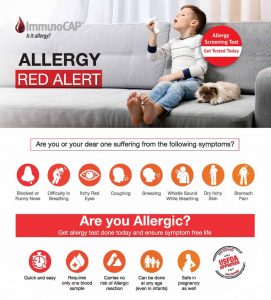Symptoms of Allergies
What is Allergy?
Allergies are a common health phenomenon where the body reacts abnormally to substances that are not usually harmful. Allergies occur when your body sees a substance as an enemy. It triggers a series of reactions in the immune system to get them out of your body.
The substances that trigger allergic reactions are known as allergens. Food items, dust mites, pollen, medicines, and even clothing materials can be allergens.
Allergies can develop at any time, even in adulthood, to substances you were not allergic to before. Therefore, it can be surprising when you experience an allergic reaction, especially for the first time.
So, read on to gain insight into the types of allergies, their symptoms, and how to relieve allergic symptoms.
Types of Allergies and Associated Symptoms
There are different types of allergies with distinct causes, each of which has associated symptoms. Based on these symptoms, one can identify their exact allergy and then trace exposure to which possible allergens caused it.
Food allergies
A food allergy is an allergy that develops when you consume certain food items. More than 170 edible substances have been reported to cause such allergies. Out of these, milk, eggs, nuts, fish, wheat, soy, sesame, crustaceans (such as crayfish, shrimp, and lobsters), and shellfish are the most common causes of food allergies.
Most packaged foods carry labels if they contain ingredients that may cause allergies to notify the consumer.
Symptoms that arise from food allergies are:
- Itching or tingling in the mouth
- Swelling of the lips, tongue, face, and other body parts.
- Nausea and vomiting
- Diarrhoea
- Breathlessness
- Swelling or tightness in the throat
- Dizziness
Drug allergies
Another common type of allergy is drug allergy. Examples of drugs that cause allergies are antibiotics, especially the penicillin and sulfonamide types.
Other drugs that induce allergies are NSAIDs (non-steroidal anti-inflammatory drugs), such as ibuprofen and aspirin. Antiseizure and chemotherapy drugs also cause allergies.
Common symptoms of drug allergies include:
- Hives on skin
- Skin rashes
- Breathing difficulty
- Swelling
- Dizziness and light-headedness
- Vomiting and diarrhoea
If you have a drug allergy, it is essential to let your doctor know when getting prescriptions for any health condition. It will help them prescribe you safer medications.
Venoms/Insects allergies
Venom and insect stings are another common cause of allergies worldwide. Like other types of allergies, it requires prompt attention. This type of allergy occurs from stings from bees, wasps, ants, and hornets.
Symptoms of this type of allergy are:
- Redness
- Swelling of the area of the bite
- Itching
- Swelling of the face and other parts of the body.
- Pain
Other symptoms include hives and difficulty in breathing.
Plant/pollens allergies
Plant and pollen allergies are seasonal allergies, occurring primarily from March to June when the amount of grass pollen is high. Pollen from plants is a significant cause of allergic rhinitis and hay fever, where the individual experiences symptoms like:
- Runny nose
- Stuffy nose due to nasal congestion
- Sneezing
- Watery eyes
- Wheezing
Dust Allergy
Dust allergy is an allergy that is triggered by dust mites, which are microscopic bugs that live on mattresses, carpets, pillows,
Breathing in waste products of these organisms leads to symptoms such as:
- Sneezing
- Runny/stuffy nose
- Wheezing
- Shortness of breath and chest tightness
Skin allergy
Skin allergy is a condition where your skin is affected by being exposed to an allergen. The three common skin allergy types are hives on the skin (urticaria), eczema (atopic dermatitis), and swelling (angioedema).
Symptoms of skin allergies include:
- Rashes
- Skin redness
- Itching
- Cracked skin
Anaphylaxis: When an allergy becomes life-threatening
Anaphylaxis is a life-threatening condition that results from allergic reactions. It occurs within seconds of exposure to the allergen and can be fatal if not treated immediately.
Anaphylaxis most commonly occurs from any allergies listed above. In anaphylaxis, the symptoms commence suddenly and escalate within seconds.
The symptoms of anaphylaxis include:
- The bronchial tissues swell up, making breathing difficult.
- Swelling of the tongue, throat, and other parts of the mouth
- Unconsciousness
- Skin rashes
- Wheezing
- Sudden drop in blood pressure.
If an individual experiences this allergic reaction, the healthcare professionals prescribe an epinephrine injection.
They are advised to carry it with them most of the time. If you see an individual having an anaphylactic shock, chances are they have an epinephrine injection on them, which you can find and administer.
Even when you have not experienced allergy symptoms before, an individual can develop allergies even as an adult. When you find yourself experiencing any of these symptoms, consult with your doctor for an allergy test.
You can prevent allergic reactions by avoiding the allergens, taking your medicine as prescribed, eating healthy, and wearing face masks when exposed to pollen, dust, and other airborne allergens.















